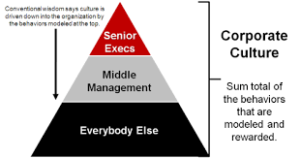The “60-60” Issue and Indoctrinating Middle Management into the Compliance Mission
 Maybe I am getting slow in my old age – or just maybe I am losing a step or two. We all face that inevitable question – and perhaps, for me, it is best illustrated when I come up with yet another in my series of profound grasps of the obvious.
Maybe I am getting slow in my old age – or just maybe I am losing a step or two. We all face that inevitable question – and perhaps, for me, it is best illustrated when I come up with yet another in my series of profound grasps of the obvious.
Here is one of my favorites – I call it the 60-60 problem. If you survey your middle managers,. And you ask them a simple question – “Are you comfortable in handling and responding to an employee who raises a specific concern with you?” – the answer you will likely receive from 60 percent of your managers, is a resounding “No.”
Now, to my second part of the 60 percent problem – if you ask your employees how and to whom they prefer to report a specific concern, they will typically answer their supervisor.
Do you understand the disconnect here? Employees want to tell their bosses directly about specific problems, and supervisors, in large part, i.e. around 6 out of 10, are not comfortable in receiving and responding to employee concerns.
When I raise this issue with compliance professionals, I usually get the “nod,” meaning they understand what I am saying and agree with my observation. But I am starting to get the feeling, however, that I may be sparking a “GM Nod” response, which was cited in the GM internal investigation of the ignition malfunction scandal – which translated into a message of we understand but we are not planning to do anything about it.
All of this prelude is meant to ask pose two simple questions:
- Is the 60-60 problem real?
- What are compliance professionals doing about it?
If the problem is real. Then companies should be doing something about it. The solution, as always, depends on the typical process – education, substantive support, and accountability. Let’s take a moment on each:
Education: If middle managers do not feel comfortable responding to employee concerns, let’s show them how to do it. Let’s train them on how to listen, what they should say and how to elevate the issue to the appropriate people in the company. We have to underscore the importance of this process to our overall commitment to an ethical culture that depends on encouraging and embedding a Speak Up culture.
Substantive Support: Beyond teaching middle managers how to encourage and respond to employee concerns, we need to develop materials, scripts, talking points and other documents needed to guide middle managers so that they feel comfortable. This I a great opportunity to ensure a consistent and strong message of the importance of reporting employee concerns and reiterating our commitment to a policy of non-retaliation.
 Accountability: If there is no accountability for the importance of this process, it will be a failed initiative. By accountability, I mean that middle managers have to be responsible for encouraging and responding to employee concerns, and they have to be assessed by their own supervisors on this process as part of their overall commitment to ethics and compliance. An initiative without accountability is a recipe for failure – unfortunately, the human species needs incentives to maximize performance. We respond best when we have incentives and ideals to define our mission.
Accountability: If there is no accountability for the importance of this process, it will be a failed initiative. By accountability, I mean that middle managers have to be responsible for encouraging and responding to employee concerns, and they have to be assessed by their own supervisors on this process as part of their overall commitment to ethics and compliance. An initiative without accountability is a recipe for failure – unfortunately, the human species needs incentives to maximize performance. We respond best when we have incentives and ideals to define our mission.
While I have heard some say that my hope and expectation in this area is unrealistic, I always encourage companies and professionals to aim high in their professions because success comes to those with a vision and commitment. This is one of those important tasks – middle managers are critical lynchpins in a company’s culture and a valuable resource.
















A great blog, Michael. Middle Management is a problem in any company when it comes to Integrity issues. I call them the semi-impermeable layer. When senior management asks them to pass on Integrity messages, they often ignore it, because they think their staff don’t care and just want to do a good job. And when staff come to them with issues, Middle Management often thinks that these issues are to petty for Senior Management to deal with and stop the concern reaching those who can act. Your 60/60 example is good and looks at the same problem from a different angle